The Scientific
& the Divine
The Scientific
& the Divine
Conflict and Reconciliation
from Ancient Greece
to the Present
James A. Arieti
and
Patrick A. Wilson

ROWMAN & LITTLEFIELD PUBLISHERS, INC.
Published in the United States of America
by Rowman & Littlefield Publishers, Inc.
A Member of the Rowman & Littlefield Publishing Group
4501 Forbes Boulevard, Suite 200, Lanham, Maryland 20706
www.rowmanlittlefield.com
PO Box 317
Oxford
OX2 9RU, UK
Copyright 2003 by Rowman & Littlefield Publishers, Inc.
All rights reserved. No part of this publication may be reproduced, stored in a retrieval system, or transmitted in any form or by any means, electronic, mechanical, photocopying, recording, or otherwise, without the prior permission of the publisher.
British Library Cataloguing in Publication Information Available
Library of Congress Cataloging-in-Publication Data
Arieti, James A.
The scientific & the divine : conflict and reconciliation from ancient Greece to the present / James A. Arieti and Patrick A. Wilson.
p. cm.
Includes bibiliographical references and index.
ISBN: 978-0-7425-1397-6
1. Religion and science. I. Title: Scientific and the divine. II. Wilson, Patrick A., 1962 III. Title.
BL240.3 .A75 2003
291.1'75dc21
2002014230
Printed in the United States of America
 The paper used in this publication meets the minimum requirements of American National Standard for Information SciencesPermanence of Paper for Printed Library Materials, ANSI/NISO Z39.48-1992.
The paper used in this publication meets the minimum requirements of American National Standard for Information SciencesPermanence of Paper for Printed Library Materials, ANSI/NISO Z39.48-1992.
For my friends Linda and Gideon Lidor
Amici magis necessarii quam ignis et aqua.
JAA
For my parents, Robert L. and Margaret E. Wilson
PAW
Contents
Preface
If only God would give me some clear sign! Like making a large deposit in my name at a Swiss bank.
Woody Allen
The goal of ancient science was absolute, immutable, universal truth based on a thorough understanding of an objects material, shape, generation, and purpose. For the most part, this truth was to be obtained through the power of human thought alone, without the help of sensory data or experimentation. One of the features of modern science, by contrast, is its revisability. Instead of aiming at absolute truth, it produces experimentally testableideally, falsifiabletheories. Among the modern criteria of judging a theory, in other words, is the theorys fit with empirical evidence. A theory always runs the risk of having to be revised or eliminated in the light of new evidence. Hence, instead of immutable truths, modern scientists prefer to speak of current models, as in such expressions as our current model of the atom. Modern science by its very nature depends heavily on experimentation and on the ability of experiments to be replicated by persons other than the original investigators. Modern scientific theories, always sensitive to empirical data, have achieved remarkable success in describing the natural world with elegance, mathematical precision, and technological fruitfulness.
One goal of religion, both ancient and modern, is an awareness, and, where possible, an understanding, of the divine in the affairs of the human and natural worlds. Religious philosophers and scientists alike have sought compatibility between their scientific conclusions and their religious beliefs ever since the beginnings of science in ancient Miletus in the sixth century B.C.E. The search for reconciliation between these apparently disparate views of the world continues in the academic world today. Despite the profound differences between ancient and modern science, despite the diversity of religious belief in the West, despite even the move from paganism to religions affirming the Bible and the variations of belief within religions affirming the Bible, there has been throughout Western history a remarkably continuous effort to reconcile science with the divine.
As we shall see, the first scientists, a group of natural philosophers known as pre-Socratics, formulated questions about the divine and about science that have scarcely ever been improved upon. Next, the Greek philosophers Aristotle and Plato and the Roman Cicero exercised their genius on the question of accommodating science and religion. This book will devote a good deal of attention to these early questions and to early attempts at integration such as these. There are several important reasons for doing so.
First, we anticipate that few, if any, readers of this book are pagans. Yet paganism treats many of the same phenomena as revealed religion: miracles, epiphanies, moral qualities, creative powers, and the like. Because pagans were not bound by the requirements of a revealed faith, however, they remained free to reflect on the nature of the divine, unencumbered, as it were, by the required dogmas of faith, for faith was not a pagan virtue. Perhaps more significantly, the Greek pagans possessed the tool of logic as a discipline, a formal, systematic methodology not practiced elsewhere. Thus they could reflect on theological difficulties with a rigor that arrived in Islam, Judaism, and Christianity only in the Middle Ages, when Greek philosophy with its system of logic was rediscovered. Hence, it is possible for modern readers to recognize and appreciate in pagan texts complex theological issues with a clarity and objectivity not easily available to those whose own religions are being examined. The case here is much the same as with ancient history. Moderns can read about the Peloponnesian Wars and observe the follies of both the Spartans and the Athenians with a detachment still not possible to Americans when they read about the American Civil War, their hearts palpitating over the despised or beloved Generals Lee and Sherman.
Second, Western philosophy is a continuing conversation, where thinkers, finding problems in a previous speakers claims, set out to solve those problems by rejecting, modifying, or adding to earlier claims. The theologians of the revealed religions developed many of their views from the conclusions of the early philosophers. Looming large over Augustine was Plato; over Averros, Maimonides; and over Aquinas, Aristotle. A good deal of modern science, especially from Galileo to Darwin, has been aimed at rejecting Aristotles claims. Both Aristotle and Plato found themselves compelled to respond to Parmenides, one of the most powerful thinkers who has ever lived, one whose views framed the conversation in the West for over two millennia.
Third, the attempts, successful and unsuccessful, at reconciling religion and science show both the limitations and the grandeur of the human mind. Here we can see that human mindsand human naturehave not changed: the broad patterns of accommodation are identical; only the details have changed.
There have been five ways of accommodating science and religion that are at least logically consistent. The first is outright and complete denial of the divine, that is, declaring that all causes are natural or in accord with physical laws. The second is outright and complete denial of science, declaring that all causes are supernatural, that is, from the divine. The third is defining the divine in such a way as to be consistent with the conclusions of natural sciencefor example, defining God as the laws of physics or interpreting religious texts in some manner other than the literal. The fourth is separating science and religion into distinct and non-overlapping spheres of authority, assigning to religion how to go to heaven and to science how the heavens go. The fifth is declaring that God and his operations are unknowable. These five ways appear to us to have the advantage at least of logical consistency. Whether they satisfy religious cravings or can be made consistent with religious dogmas is a topic that we shall address. Most problematic, as we see it, is the reconciliation of specific religious claims with science. The doctrine that Mohammed is the last prophet, for example, or that Jesus ascended into heaven, or that the various commandments were delivered by God at Sinai represent the greatest challenge to accommodation with natural science.
Next page

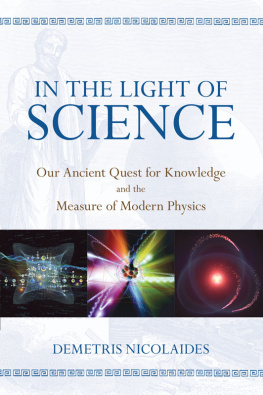
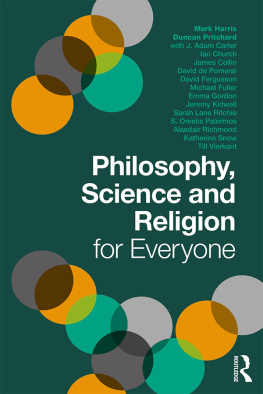
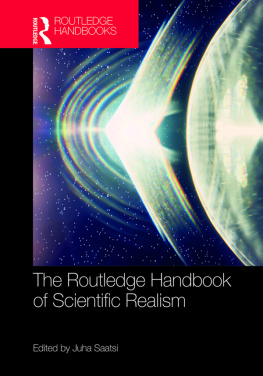
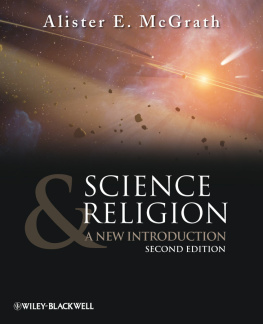

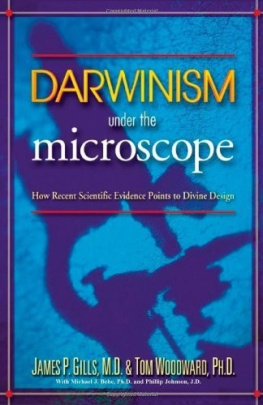
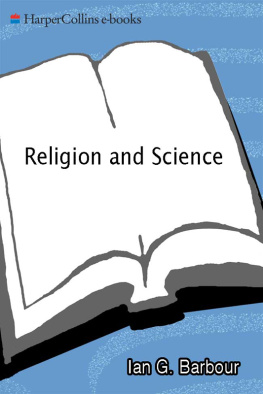
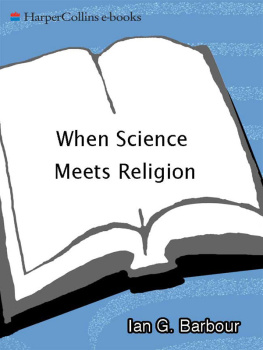
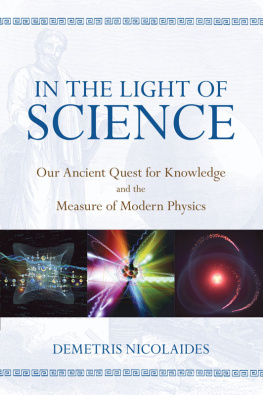
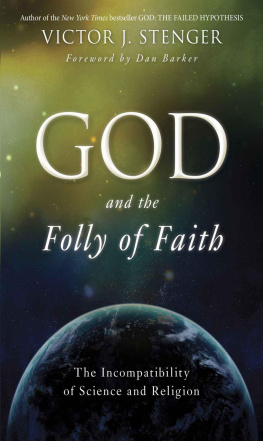

 The paper used in this publication meets the minimum requirements of American National Standard for Information SciencesPermanence of Paper for Printed Library Materials, ANSI/NISO Z39.48-1992.
The paper used in this publication meets the minimum requirements of American National Standard for Information SciencesPermanence of Paper for Printed Library Materials, ANSI/NISO Z39.48-1992.